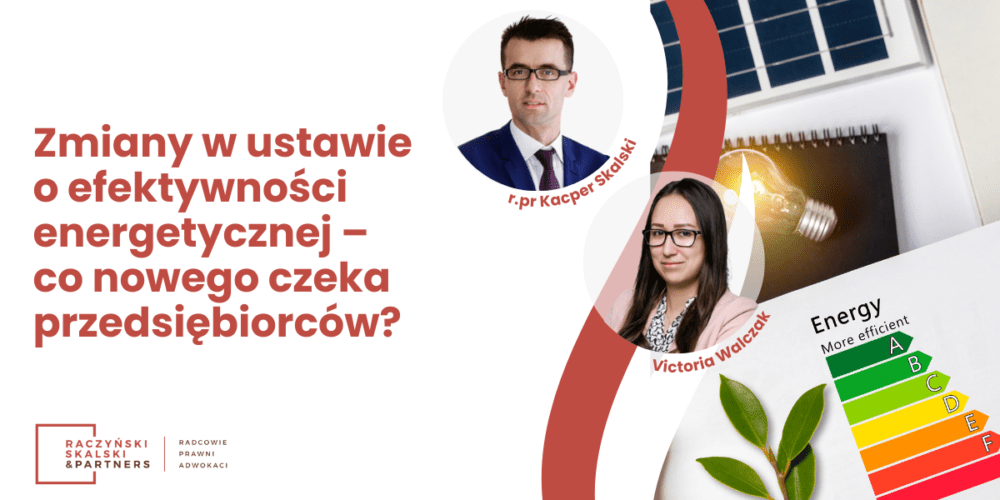On November 19, 2024, the government presented the assumptions of the draft laws on amendments to the Law on Energy Efficiency and Certain Other Laws (UC77). The purpose of the amendment is to bring Polish regulations in line with the requirements of the EU Parliament and Council Directive 2023/1791 of September 13, 2023 on energy efficiency and amending Regulation (EU) 2023/955 (hereinafter: “Directive 2023/1791”).
According to the published announcement, the Ministry of Climate and Environment focused on the following issues in its work on the amendment:
-
- implementation of the “efficiency first” principle, derived from Article 3 of Directive 2023/1791, by requiring investors to conduct an analysis of energy efficiency solutions for projects or investments exceeding €100 million (€175 million for transport infrastructure projects);
- introducing obligations for businesses to conduct an energy audit, implement an energy management system, and report on energy consumption. Proposed solutions include:
- implementation of a certified energy management system (for enterprises whose average annual energy consumption over the past three years, including all energy carriers, exceeded 23.61 GWh (85 TJ) per year);
- amending the regulations on the obligation to conduct an energy audit (for enterprises whose average energy consumption over the past three years, including all energy carriers, exceeded 2.78 GWh (10 TJ) per year);
- reporting information on the energy consumption of an enterprise whose average annual energy consumption, including all energy carriers, was more than 2.78 GWh (10 TJ);
- updating the energy audit procedure for businesses (except for the SME sector);
- implementation of provisions that require the owner of infrastructure whose electricity demand exceeds 500 kW to make public information on the energy performance of data processing centers, in accordance with the requirements to Annex VII of Directive 2023/1791, i.e:
- “the name of the data center, the name of the owner and operators of the data center, the date of commencement of operations by the data center, and the municipality in which the data center is located.”
- “the data center’s floor area, installed capacity, annual inbound and outbound data flow, and the amount of data stored and processed in the data center.”
- “the data center’s performance in the last full calendar year according to key performance indicators relating to, among other things, energy consumption, power use, temperature setpoints, waste heat use, water use and renewable energy use.”
3. setting a new national final energy savings target (through an energy efficiency certificate system). This target will be implemented based on indicators derived from Article 8 (1) of Directive 2023/1791, viz:
- 0.8% of annual final energy consumption from January 1, 2021 to December 31, 2023, averaged over the last three years preceding January 1, 2019;
- 1.3% of annual final energy consumption from January 1, 2024 to December 31, 2025, averaged over the last three years preceding January 1, 2019;
- 1.5% of annual final energy consumption from January 1, 2026 to December 31, 2027, averaged over the last three years preceding January 1, 2019;
- 1.9% of annual final energy consumption from January 1, 2028 to December 31, 2030, averaged over the last three years preceding January 1, 2019.
4. modification of the mechanisms of the system of energy efficiency certificates jw, in particular, by:
- establishing a regulated profession of energy efficiency auditor,
- digitalization of the energy efficiency certificate system,
- modification of the Central Register of Final Energy Savings;
5. implementing the goal of reducing final energy consumption by public institutions by 1.9% per year compared to 2021, and introducing a system for monitoring and reporting on the performance of obligations in this regard;
6. introduction of a qualification, accreditation and certification system for a new regulated profession – energy auditor – and energy consumption service providers.
Details of the draft are available on the Government’s website: Draft Law on Amendments to the Law on Energy Efficiency and Certain Other Laws – Chancellery of the Prime Minister – Gov.pl Portal (www.gov.pl)



